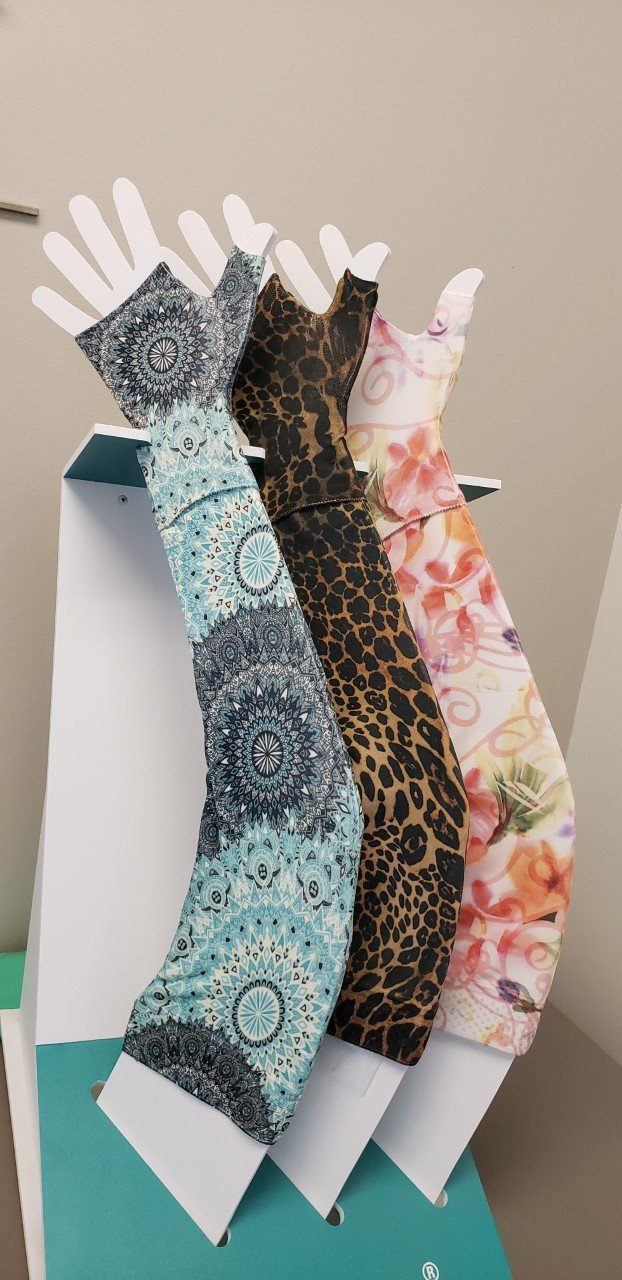Lymphedema
Lymphedema Garments:
Lymphedema can be a very serious condition and it is important that you have access to all of the products that can help you manage and maintain your condition. The Plaid Daisy has specialized in compression therapy for many years, offering off the shelf and custom lymphedema garments. We work very closely with therapists and physicians to find the best garments for each individual situation. Family Medical has been a leading supplier of this therapy for over 25 years, with The Plaid Daisy focusing on the upper extremities since the division began in 2002.
The Plaid Daisy carries in stock, off the shelf compression sleeves, gloves and gauntlets. We have access to wrap style garments as well as nighttime compression garments. We work with the top vendors of compression therapy, including Juzo, Medi USA, BSN Medical, Circaid, Sigvaris, Solaris, Farrow, Jovi, and BiaCare.
Your insurance may or may no cover compression garments. With the introduction of the Lymphedema Care Act in 2024, Medicare has improved coverage of medically necessary and doctor prescribed Lymphedema garments. We recommend that you contact your insurance provider to verify your benefits in regards to compression. We can also assist in working with your insurance company for coverage of these purchases.
There are two main types of compression sleeves: daytime sleeves and nighttime sleeves. Both come in ready-to-wear (or off-the-shelf) and custom versions. Ready-to-wear sleeves are made by the manufacturer in different sizes, and you, your therapist and our certified fitter choose the size that fits your needs. Custom sleeves are made to fit your specific measurements. A custom sleeve may be needed if your arm is unusually long or irregular shaped, or if the lymphedema is particularly aggressive and/or advanced. Or it may be a good option if you try a ready-to-wear sleeve and it doesn't seem to do the trick.
Daytime Sleeves:
A daytime sleeve is a tube of strong yet somewhat flexible fabric that extends from the wrist up to the axilla (underarm). The compression is graduated, getting less as it moves up the arm, this supports the flow of lymph up the arm to the axillary (underarm) lymph nodes. Depending on the manufacturer, sleeves come in flesh-tone colors (ivory, tan, brown, etc.), as well as more colorful styles and even prints. So you have a choice of trying to have the sleeve blend in with your skin, coordinate with your cloths, or make more of a fashion statement on it's own.
Sleeves also come at different pressure levels, which are described with a numerical classification system that ranges from low pressure to high pressure, class 1 through 4. The amount of pressure is measured in terms of "mmHg", or millimeters of mercury, based on the amount of pressure exerted by one millimeter of liquid mercury. (You're probably familiar with this from your blood pressure readings, which are also expressed in terms of "mmHg.")
Generally, more severe cases of lymphedema require a higher-class sleeve, while milder cases require a lower class. Some companies make even lighter pressure sleeves -15-20mmHg- for the mildest cases. Your lymphedema therapist can help you determine what level of pressure is right for you. Over time, you may find that you need to move to a higher-pressure or lower-pressure sleeve, depending on how your symptoms respond.
The cost of a daytime sleeve can range from less than $100 to about $300.
Nighttime Sleeves:
Around the clock management of lymphedema is important because it helps prevent re-accumulation of fluids while you sleep. If you find that daytime compression isn't enough to control your symptoms, you may need to wear a compression night garment.
Compression garments with chip foam are night garments that provide gentle lymphatic massage all night. The foam presses into the affected area, creating tissue stretching and pressure differentials. This encourages reabsorption of lymphatic fluid and helps lymph flow. Many garments are custom made, but many are high quality off the shelf as well.
Nighttime sleeves are more expensive than daytime sleeves, ranging anywhere from $200 to more than $1,000. Therefore, insurance coverage may be more of a concern. Check with your lymphedema therapists and healthcare professionals to determine if these garments may work for you.


